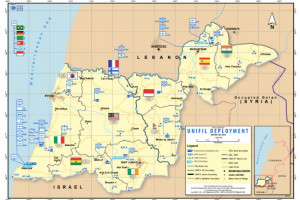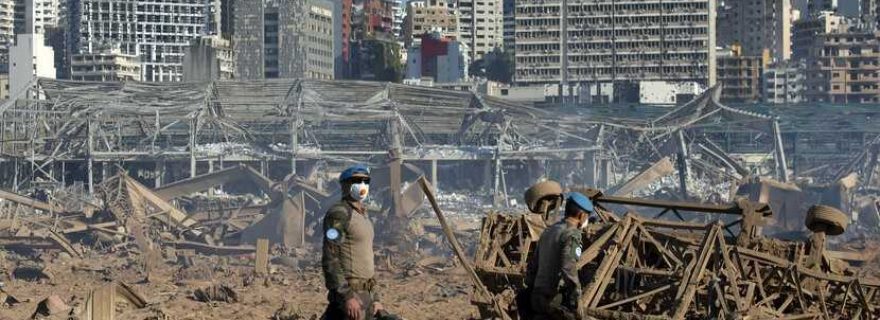UNIFIL & The Beirut Blast
What role should peace operations play in humanitarian disasters?
Last week the mandate for the United Nations Interim Force in Lebanon (UNIFIL) was renewed again for its 43rd year. The renewal comes at a time when Lebanon is at crisis point. Beirut is reeling from the blast disaster of 4 August when the country was already buckling under the pressure of a growing economic and political crises and the refugee spillover from the Syrian War. The resignation of the Lebanese Government has left the state in a political vacuum. The unanimous decision to renew the mandate illustrates UNSC recognition of the mission’s important stabilizing role in the region.
Adam Day and Charles Hunt recently argued that the Covid-19 pandemic presents an opportunity to transform peacekeeping, making it more flexible and innovative to take account of constantly evolving conflict drivers. The Under-Secretary-General for Peace Operations stated the UNIFIL peace operation stands ready to help. With so much personnel and equipment already deployed in Lebanon, an obvious question is should UNIFIL expand its current remit to assist in Beirut? Could it be a test case for this transformation?
UNIFIL: An old mission with a modern mandate
Despite having the word ‘interim’ in its name, the UNIFIL mission was first deployed in 1978 to confirm the withdrawal of the Israeli Defense Forces from southern Lebanon and assist the Lebanese government in establishing control of the area. The mission has survived the Lebanese civil war and the Israeli withdrawal from South Lebanon in 2000. After the war between Hezbollah and Israel in 2006, the operation’s mandate was revised to include among other things: monitoring the cessation of hostilities, reintegrating the Lebanese Armed Forces into South Lebanon, and ensuring the area of operations remains free from weapons not belonging to the state. Currently, the number of troops deployed hovers at around 10,500 and last week’s renewal reduced the troop ceiling to 13,000.
As a hybrid mission with traditional and modern elements, UNIFIL conducts multiple ground and maritime patrols daily to monitor the line of withdrawal (The Blue Line) and prevent escalations between the armed forces of Lebanon and Israel. The range of humanitarian activities it provides is extensive, ranging from the provision of veterinary services to free dental care. That said, UNIFIL’s record is described as mixed at best. While there has not been a war since 2006, the operation has not been able to push back on Hezbollah’s de facto control of the area owing to the party’s political dominance and the large swathes of support it receives in the area of operation. As such, during the annual renewal of its mandate (on 31 August each year) at the UNSC, UNIFIL increasingly receives criticism for this from the US.
The risk of mandate creep
This is not the first time UNIFIL has been asked to expand its remit. In the early years of the Syrian War, there was speculation that UNIFIL might be deployed north, further along the Syrian border to prevent skirmishes there that might impact Lebanon’s national security. In particular, the concern was to deter the spread of violent extremism into Lebanon. At the time, UNIFIL pushed back on these suggestions, reiterating its central mandate, stressing the unfeasibility of patrolling a second border and demonstrating its awareness of the need for caution in expanding the remit of peace operations, not least due to the limitations of finding viable troop contributing countries (TCCs).
However, this case is different because it relates to humanitarian aid and disaster response for which UNIFIL has an impressive track record. So, should UNIFIL help? There are several elements to keep in mind.

First, despite its shortcomings the operation still matters when it comes to monitoring hostilities in the south of the country.There have been multiple recent skirmishes between Israel and Hezbollah, and Israel has conducted airstrikes on Hezbollah convoys and positions in southern Syria. While UNIFIL cannot prevent these incidents, it shines an international spotlight that constrains actors on both sides of the Blue Line, providing the Security Council with an early warning system. Therefore, the redeployment of assets from its area of operations to Beirut would need careful planning and execution.
Second, a decision of this sort needs strong support from New York. While the Force Commander can recommend that UNIFIL take on an active role, the Security Council has to agree. In addition TCCs will need briefing on where their troops are moving and for how long. However, there is precedent for such a move. In 2005, the Security Council authorized the temporary redeployment of troops from the United Nations Operation in Burundi (ONUB) to the United Nations Organization Mission in the Democratic Republic of the Congo (MONUC).
A decision to redeploy some of its assets and personnel could help maintain peace and stability during this political vacuum which has the potential to disrupt life in the South, for example in the form of popular protests. Damage to homes and livelihoods in Beirut may also drive a new wave of migration to the South, where many Lebanese retain properties. UNIFIL should, at the very least, conduct a rapid situational awareness report of how the blast has affected the area of operations. Given the scale of the disaster and the fragility of the Lebanese state, a contribution to the relief efforts in Beirut might be welcome.
The question of how peace operations should respond to national disasters appears to be functioning on a case-by-case basis. Given COVID-19, perhaps the time has come for UN HQ to step up and start formulating a policy position on this issue.
Diego Salama is a PhD Candidate in History of International Relations at Leiden University. His research focuses on history of the United Nations and Peacekeeping.
Vanessa Newby is an Assistant Professor at Leiden University. Check out the latest review of her book ‘Peacekeeping in South Lebanon: Credibility and Local Cooperation’ with Syracuse University Press (2018) in The Hague Journal of Diplomacy https://brill.com/view/journals/hjd/15/3/article-p451_14.xml



